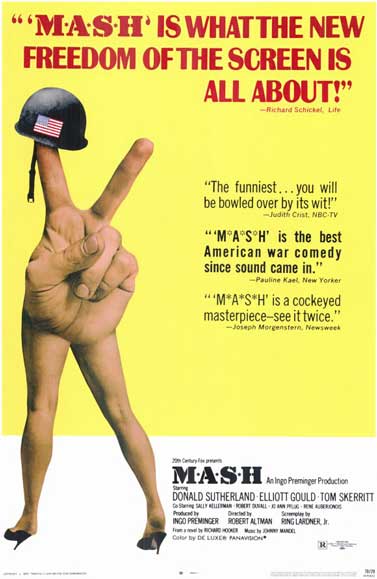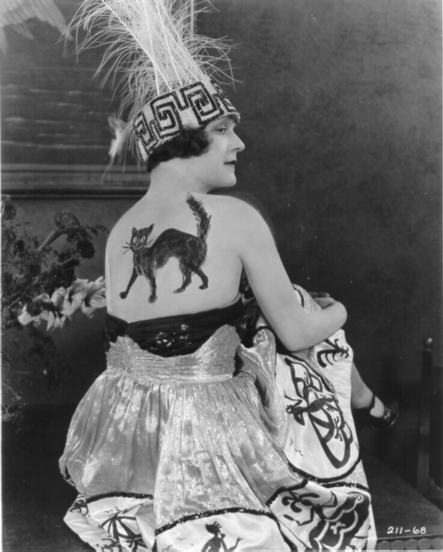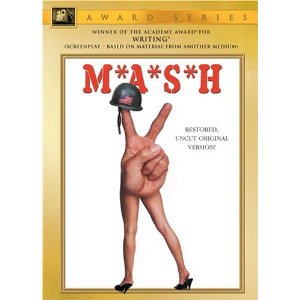‘The Best American War Comedy Since Sound Came In’
Celebrating Robert Altman’s M*A*S*H On Its 40th Birthday
By MovieDiva[Ed. Note: This year marks the eleventh anniversary as Film Curator at the North Carolina Museum of Art (NCMA) in Raleigh, NC, of the film authority known online as MovieDiva. Her reviews and commentary are at http://www.moviediva.com/MD_root/webpages/MDIndex.htm]
Director Robert Altman was unknown until he was 45. In ten years he made a series of modern film classics and was then written off as a has-been. But, with 1992's The Player he was rediscovered. For moviegoers of a certain age (my age) any new Altman film is a must-see.
After a WWII Army stint co-piloting bombing missions over Japan, Altman got into the movies by writing scripts. He shot industrial films for International Harvester, and exploitation movies like The Delinquents and The James Dean Story. Between 1957 and 1964 he worked on at least 20 TV shows, including The Alfred Hitchcock Show, Route 66, Maverick and numerous episodes of Bonanza and Combat. He did the only anti-war episode of that inexplicably popular 1960s TV show about "The Good War." Altman managed to get fired from most of them for his experimentation with non-linear narrative and overlapping sound. He learned how to work quickly and make do; "I had practice working for people who don't care about quality, and I learned how to sneak it in."
Twentieth Century Fox had received a screenplay from blacklisted writer Ring Lardner, Jr., adapting Richard Hooker's novel M*A*S*H, an anti-war comedy based on his own experiences as a surgeon in the Korean War. M*A*S*H was published in 1968, when its anti-authoritarian tone was more in keeping with the national mood than it would have been in the early 1950s. Many of the episodes in the film are in the novel, the golf trip to Tokyo, the football game, and even the shower scene, to a degree. And the flippant tone is the same.
M*A*S*H, 1970: ‘Look, mother, I want to get to work in one hour. We are the Pros from Dover and we figure to crack this guy’s chest and get out to the golf course before it gets dark.’ Donald Sutherland and Elliott Gould in a classic scene from Robert Altman’s film.Altman was the 18th choice for director, and producer Ingo Preminger said if he'd seen his previous film, That Cold Day in the Park, starring Sandy Dennis as a female sexual predator, Altman never would have been hired. Altman didn't want movie stars, he wanted the ensemble to dominate...in other words, for the director to be the star. Elliott Gould, Donald Sutherland and Robert Duvall had been in films before. Gould had just received an Oscar nomination for his supporting role in Bob and Carol and Ted and Alice, but only half the cast had movie experience. They lived in tents on location 20 miles from the studio and were encouraged to improvise. Altman said, "Fox had two other wars going on;" Patton and Tora! Tora! Tora! were in production at the same time. The executives did not interest themselves overly in a low-budget war comedy being shot by a bunch of relative unknowns.
Once Altman returned to Fox for post-production, the producers were horrified by the rambling, bloody and profane footage and felt the film was unreleasable. In the editing room, Altman hit upon the use of the loudspeaker announcements as a linking device that gave his episodic film the structure it needed. There was absolutely no mention of Korea in the movie, and Fox insisted that be fixed. An introductory title and the pa announcements were used to clarify that this was certainly not the current Asian war, Vietnam. Gould and Sutherland had rebelled on the set, convinced that Altman's unstructured directing would destroy their fledgling careers. Ring Lardner, Jr. was horrified at the improvisation that camouflaged his original script. He said, "You ruined my picture!" and took solo writing credit only under protest, although his dissatisfaction did not prevent him from accepting the film's only Oscar, for Adapted Screenplay.
M*A*S*H: The Shower Incident: ‘Author! Author!’M*A*S*H was groundbreaking in many ways. Language was raw. Hawkeye and Trapper John disassociate themselves completely from the military with a Marx Brothers-like sense of anarchy. There's also a dismissal of the traditional war movie relationship between religion and patriotism. The New York Times said, "It was the first American movie to openly ridicule belief in God." Groundbreaking 1970s movies like Easy Rider, Midnight Cowboy, Taxi Driver and The Godfather were by men and about men. Women are about as important as drugs or booze, as was also true in the filmakers' lives in many cases. The anti-heroes' humiliation of nurse Hot Lips Houlihan greatly undercuts the humor of their antics. Perhaps, they feel themselves bullied by the military, and so torment someone who is "regular army," although, as a woman she is even more powerless than they are. In the novel, the majority of nurses are treated respectfully as colleagues. For sex, most of the characters take every opportunity to visit Korean whorehouses. Thirty years later, the film's sexism seems easier to tolerate than the African-American neurosurgeon's nickname, "Spearchucker."
I first saw M*A*S*H in 1970, and remembered both that the operating room scenes were more shocking and that the pace was fast and frantic. At some point, the original X rating was changed to PG, perhaps when the film was first put on video. Peter Biskind, in Easy Riders, Raging Bulls, says this was the first mainstream American movie to use the word f**k (during the football game) but it was either buried in the sound mix or removed for the lower rating. I remembered spurting blood, as well (and didn't I see a clip like that on AMC's Backstory: M*A*S*H)? That is certainly not the case in the print shown at the North Carolina Museum of Art. Far from being frantic, the rhythm of the film is leisurely, giving the feeling of calm in the eye of a hurricane. And surprisingly, the film, especially with an audience, is still funny. Is this the only comic football game in movie history that actually makes you laugh?
M*A*S*H: Suicide Is Painless. The famous song was written by Johnny Mandel (music) and Robert Altman’s 14-year-old son, Mike Altman (lyrics). Vocal in this scene is by Pvt. Seidman, played by Ken Prymus. Director Altman said his son made more in royalties off ‘Suicide is Painless’ than the $70,000 he was paid for directing the film.This film was so popular and so profitable (the third highest grossing film of the year, after Love Story and Airport) it made the rest of Robert Altman's career possible. Pauline Kael, writing in The New Yorker, was the most influential film critic of her day, and she adored Altman and championed his films calling M*A*S*H "the best American war comedy since sound came in." Not everyone agreed, of course. Louise Bartlett in Films in Review called it a "tasteless, and therefore ineffective satire" filled with "hippie-yippie slovenliness" and wished, "Should producer Preminger ever need to be defended by an army in the future, I hope it is by an army like the one he depicts in M*A*S*H." M*A*S*H won the NY Film Critics Best Picture Award, and was nominated for Oscars for Best Picture, director, adapted screenplay (Lardner win was 29 years after he won for the Tracy-Hepburn Woman of the Year) and Sally Kellerman for Best Supporting Actress. It's a little snapshot of America that the Best Picture of 1970 was Patton and Best Feature Documentary was Woodstock.
In the forward to M*A*S*H, Richard Hooker writes: "The surgeons in the M*A*S*H hospitals were exposed to extremes of hard work, leisure, tension, boredom, heat, cold, satisfaction and frustration that most of them had never faced before. Their reaction, individually and collectively, was to cope with the situation and get the job done. The various stresses, however, produced behavior in many of them that, superficially, at least, seemed inconsistent with their earlier, civilian behavior patters. A few flipped their lids, but most of them just raised hell, in a variety of ways and degrees..."
c.moviediva2001"40 Years After 'MASH,' Gould Reflects on an Era"
Wish the reporter had asked Gould when his opinion of Altman's method changed. During the shoot both he and Donald Sutherland, as the MovieDiva notes above, rebelled against Altman's "unstructured directing, feeling it would destroy their fledgling careers." From the New York Times, September 4, 2010.
M*A*S*H opening credits. Directed by Robert Altman.
THE BLUEGRASS SPECIAL
Founder/Publisher/Editor: David McGee
Contributing Editors: Billy Altman, Laura Fissinger, Christopher Hill, Derk Richardson
Logo Design: John Mendelsohn (www.johnmendelsohn.com)
Website Design: Kieran McGee (www.kieranmcgee.com)
Staff Photographers: Audrey Harrod (Louisville, KY; www.flickr.com/audreyharrod), Alicia Zappier (New York)
E-mail: thebluegrassspecial@gmail.com
Mailing Address: David McGee, 201 W. 85 St.—5B, New York, NY 10024
Founder/Publisher/Editor: David McGee
Contributing Editors: Billy Altman, Laura Fissinger, Christopher Hill, Derk Richardson
Logo Design: John Mendelsohn (www.johnmendelsohn.com)
Website Design: Kieran McGee (www.kieranmcgee.com)
Staff Photographers: Audrey Harrod (Louisville, KY; www.flickr.com/audreyharrod), Alicia Zappier (New York)
E-mail: thebluegrassspecial@gmail.com
Mailing Address: David McGee, 201 W. 85 St.—5B, New York, NY 10024




